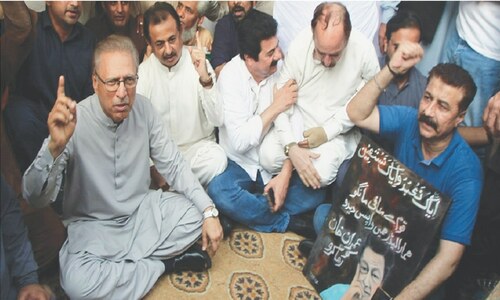ISLAMABAD: A trial court seized with the Toshakhana case summoned Pakistan Tehreek-i-Insaf (PTI) chairman Imran Khan on May 10 for indictment.
Additional District and Sessions Judge (ADSJ) Humayun Dilawar also ruled on Friday that the complaint filed by the Election Commission of Pakistan (ECP) seeking criminal proceedings against Mr Khan for concealing state gifts in his assets declarations was maintainable.
According to the ECP’s complaint, Mr Khan “has deliberately concealed the material facts by not disclosing the details of gifts…has also made evasive and ambiguous statement in his written reply that the gifts purchased by him during the financial year 2019-20 were further gifted by him or on his behalf to others”.
Advocate Khawaja Haris, representing the PTI’s chairman, argued against the maintainability of the petition before the ADSJ and on the jurisdiction of the trial court.
He contended before the court that the complaint against Mr Khan has been filed under Section 190-A of the Elections Act, 2017.
He read out Section 190 and 193 of the Elections Act and argued that the trial court cannot hear this matter unless the complaint is filed under the appropriate section of law.
The judge observed that the counsel for Mr Khan did not raise any objection against issuance of arrest warrants by the sessions court when former premier challenged these warrants before the Islamabad High Court (IHC).
He asked Advocate Haris to conclude the arguments on the maintainability and jurisdiction of the court as the trial has already been delayed.
Mr Haris asked the court to treat Toshakhana case on a par with other routine cases pending before his court.
He argued that ECP lacks jurisdiction to proceed against a lawmaker for corrupt practice.
He said that the District Election Commissioner (DEC) filed the complaint before the sessions court without authorisation. During the hearing, when DEC Waqas Malik reached the courtroom, Advocate Haris said that at the time of filing the complaint, Mr Malik was not DEC and the signatures on the complaint filed before the sessions court are also different.
ECP lawyer Amjad Pervaiz cited a case related to Election Laws of 1996 and said the Supreme Court has ruled that sessions court has jurisdiction to entertain such matters.
He pointed out that the court had summoned Mr Khan on December 15 last year, but could not proceed further.
He said the ECP conducted the scrutiny of Mr Khan’s assets declarations and its details were submitted in the court by an official of the commission.
He pointed out that the complaint against the PTI chairman was filed under Section 173 of the Elections Act and the sessions court could have decided this within 3 months.
According to him, the ECP has issued direction for filing criminal complaint against Mr Khan, hence, the complainant has completed all codal formalities.
Advocate Pervaiz concluded that the former prime minister’s objections on maintainability and jurisdiction has no legal backing and it is being done to delay the court’s proceeding.
Published in Dawn, May 6th, 2023














































Dear visitor, the comments section is undergoing an overhaul and will return soon.